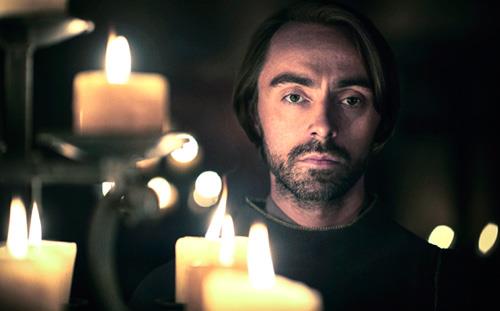
"No plans have been made for the succession."
Oh, dear. Those are words one never wants to hear in a period costume drama about warring kings and kingdoms — unless, of course, one has some time on one's hands and are looking for something to binge-watch, and Game of Thrones is a fading memory.
The Last Kingdom is both a pretender and a contender in TV's game of clones. It won't make you forget Game of Thrones exactly, but there are times when it may come close.
First, the details.
Last Kingdom is now in its fourth season. It began on BBC, where it lasted two eight-episode seasons before being picked up by Netflix. A different showrunner, a bigger budget, and expanded season orders — Last Kingdom's seasons are now ten episodes — ushered in a new era of bloodletting and skullduggery in this long, often too-complicated-for-its-own-good tale of good, God-fearing Saxons against filthy, pagan Viking invaders.
The fictionalized story, loosely adapted from Sharpe's author Bernard Cornwell's series of Saxon novels — themselves loosely based on the real-life history of King Alfred the Great's ambitious, lifelong calling to unite squabbling English kingdoms under the Christian cross in 9th century Britain, has been given the full Game of Thrones treatment, from spectacular battle scenes to a liberal attitude toward sex and violence.
It's not TV, to borrow HBO's old slogan, it's Netflix.
Early reviews, largely favorable, compared Last Kingdom to Game of Thrones, but to these eyes, that's a little like comparing Boris Johnson to Winston Churchill. A more apt comparison would be to Vikings, the History channel's 2013 costume drama about the Viking raider, Ragnar Lothbrok, which has lasted six seasons. Vikings' most recent season premiered last December; Last Kingdom's most recent season bowed this past spring, in the middle of the COVID-19 lockdown. (Netflix, not one to be outflanked by History, is reportedly developing a sequel series of its own, Vikings: Valhalla.)
The Last Kingdom began as a basic quest story, familiar to fans of the genre: A young boy is orphaned and flees into obscurity, vowing revenge on his parents' murderers. He's adopted by invaders — the Viking Danes — and spends the rest of his life with one foot in the world of the Norsemen and their spiritual belief in a panoply of gods and the afterlife of Valhalla, and the other foot in the Christian, God-fearing world of his ancestors-by-blood. It's a classic trope of fantasy fiction and encompasses everything from Conan the Barbarian to Lord of the Rings.
In terms of pure storytelling and heart-wrenching emotion, though, Game of Thrones is in a whole other league. Thrones is not just about characters one can root for — a real failing of Last Kingdom. Even Alfred the Great, played with a dearth of charisma by the English actor David Dawson (top), is depicted as weak, vain, and capricious, and the fictional hero Uhtred of Bebbanburg, played by the German actor Alexander Dreymon, is given to mercurial rages and mood swings that veer wildly from one episode to the next.
Game of Thrones told a complex, complicated story about warring clans, but taken as a whole, stepping back and viewing the entire series from on high, it was basically the story of a group of children who, over the course of eight seasons and ten years, grew up before our eyes, something even cast members Sophie Turner, Maisie Williams, and Isaac Hempstead Wright noted, as they grew from children to young adults throughout filming.
The Last Kingdom is set in the Dark Ages, and boy does that show: Wales, East Anglia, and Northumbria are damp, gray, muddy, and wet. An unrelenting gloom permeates everything. The peasants are revolting!
Game of Thrones, on the other hand, was damp and dingy at times — much of it was filmed in Northern Ireland — but it also had settings of almost ethereal beauty, from the glacial fjords and sweeping snowfields of Iceland to the Adriatic and Mediterranean allure of Croatia and Spain to the Saharan sultanates of Morocco. Game of Thrones had dragons; The Last Kingdom has grubby Vikings in horned helmets.
There are times when it seems as if The Last Kingdom is deliberately trying to confuse the viewer; Saxon and English place names fade on top of one another in an endless stream of onscreen captions, and giving very different characters similar-sounding names — Aethewold, Aelswith, Aethelred, Aethelflaed, Aeilfled, Aelfric, Aeithelhelm — is just asking for trouble.
And yet.
The Last Kingdom has moments of real power. The third season, which streamed on Netflix in November 2018, revolved around one of the most memorable female TV villains of recent memory, the Viking seer Skade (pronounced ska-day), played with an almost Shakespearean level of zeal and wayward enthusiasm by the young Norwegian actress Thea Sofie Loch Naess. The season was based on Cornwell's novels The Burning Land and Death of Kings, and because of its focus on a single character — even the casual viewer will find it hard not to believe in curses after watching Skade slice and dice her way through Last Kingdom's third season — one can get a sense of why so many Netflix subscribers have stayed with Last Kingdomthrough thick and thin.
Last Kingdom also, intentionally or otherwise, has a lot to say about the present state of world affairs, where self-interest coupled with a lack of empathy and an unswerving belief in absolute power and the rule of force leads to a vacuum of genuine leadership.
In the most recent episodes, the late King Alfred the Great's successor, the boy king Edward, vows to reunite the kingdoms once again, under a Christian God, despite the machinations of Lord Weasel and Lord Stoat.
The peasants are still revolting, but hope springs eternal in Saxon England — just as one always hopes a promising TV epic will somehow find a way to become a great TV epic. Just don't expect Game of Thrones.